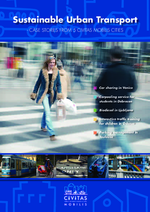Developing a car-pooling service for students
Thematic areas
Active mobility
- Cycling
Collective passenger transport & shared mobility
- Ride sharing
Summary
By creating an Internet-based service to help university students find car-sharing partners for common journeys, this measure contributes to reducing the negative impacts of individual mobility by lowering the number of single-occupancy vehicles on the roads.
Implementing sustainable mobility
Debrecen is the second largest city in Hungary and houses one of the biggest universities in the country. An average of 25,000 students live and study in Debrecen during the week, many of them heading home for the weekend. While the majority used public transport, student discounts were reduced significantly prior to the measure, while the quality of the public transport services deteriorated. This meant that many students were keen to purchase their own car.
The city of Debrecen therefore initiated a low-cost pilot project, introducing the concept of sharing private cars among a limited target group of university students, demonstrating the alternatives to single-occupancy car use.
Progress
A professional car-pooling contractor was hired to develop the system. However, to ensure that the system matched the needs and wishes of the target group, the student organisation of the University of Debrecen was also involved in the development of what was named the “Utitars”, or “Travel Companion” programme. Students can register with the car-pooling system via the municipal web page. Once logged in, they can place ads either looking for or offering rides for specific journeys on an electronic bulletin board, giving the date and time of the journey plus contact information (e-mail or phone number).
The service was marketed by local television and radio stations, leaflets, and the university intranet.
Some legal issues arose during implementation in relation to data security. Also, since the price of trips was advertised on the web, the city could be held responsible when someone purchased a ride. In addition, the driver would then be due to pay tax on profits, which deterred people from signing up.
Outcomes
When the project period ended in March 2008, 100 users had registered and posted 204 ads. In a context where car pooling was previously completely unknown, these numbers can be considered successful.
The success was primarily due to the fact that the students were involved in the development of the system and that the University of Debrecen supported the initiative and allowed the service to be marketed through the university intranet. The fact that the student discount for public transport had recently been lowered also made car pooling more attractive to the students.
However, to make car pooling a real success throughout the country, the legal issues must be addressed and the system further developed to offer more information and features. An even bigger barrier is a general reluctance among Hungarians to share their car in the first place. Owning a car in Hungary is a very much sought after status symbol. When Hungarians become car owners, they are not necessarily willing to share their car with others. This barrier can only be overcome by making car pooling better known, for example by introducing the concept to students before they purchase a car themselves.
This fact sheet has been updated by a third party on the basis of available information (not by the city itself), therefore we do not guarantee any data with respect to their content, completeness or up-to-dateness.








